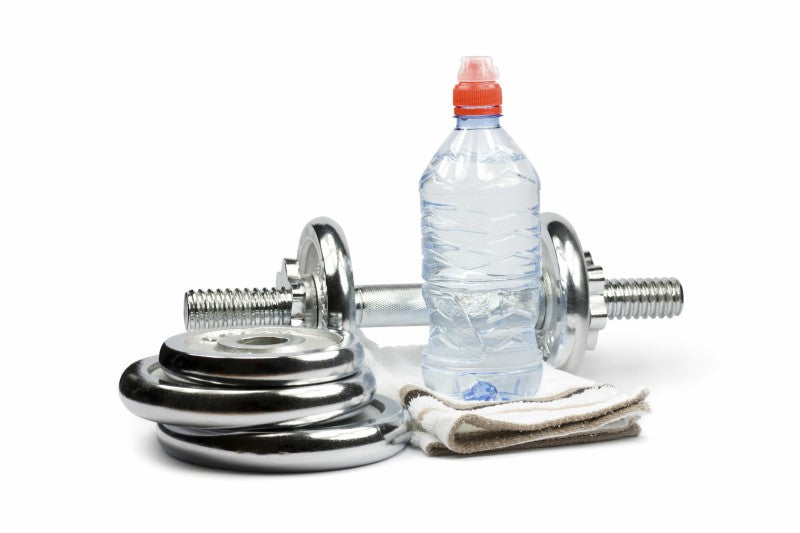When someone is asked, "How much water have you drank today?" their typical response is "I don't know" or something like "Maybe a couple glasses."
We all know we are supposed to drink plenty of water each day. We've been told time and time again the importance of consuming a quality amount of water. Unfortunately, many of us think the one or two small glasses of water we had with lunch is enough.
Well, it's not.
A very small percentage of us take the time to track or document our daily water intake. Most of us could remember the license plate of the car that cut us off this morning before we could remember how many ounces of water we consumed throughout the day.
At times we can get so focused on tracking
our daily intake of calories, proteins, fats, and carbohydrates that we tend to forget about tracking our water consumption. Or, we tend to quench our thirst through other outlets like juices or smoothies, thinking the amount of water in these beverages are enough to reach our daily goals. Well, again, it's not.
Water isn't just that liquid you use to make your coffee every morning. Water is essential to keeping your body functioning correctly as water helps your body perform several vital functions. The most important functions water performs internally within your body include:
- Transportation of glucose and oxygen to the muscles
- Digestion and converting food to energy for your body to use
- Regulating your body temperature during exercise
These are just some of the many functionalities water performs within your body. If you are not providing your body with enough water on a daily basis your overall health and performance in the gym or on the field could be suffering.

Recommended Water Intake
Now, the amount of water an individual needs is going to vary based on the individual. When thinking about water consumption one should think about it in the same mindset as caloric intake. Depending on your job, normal daily activities, and how long or hard you are training, you are going to adjust your water levels accordingly.
The more energy you are expending in your day or in your workout, the more fluid you are going to need to replace what you have lost in sweat. The more muscles you?re using in your body equates to your body needing more energy, thus more water being needed to replenish your body.
A studying examining the pre-exercise hydration levels in athletes and recreational exercisers found that almost 50% of the exercisers in the study were dehydrated.
[1] Almost half of these participants were entering their workouts in a state of dehydration, so imagine what state the body was in by the end of the workout? Or, at the end of the day before going to bed? Your body could be in a continuous state of dehydration, affecting your ability to function, process food properly, and performing at an optimal level in the gym.
Dehydration can cost you those gains you've been working so hard towards achieving because dehydration can negatively affect your muscle development. With a negative impact on muscle growth and recovery, your body is going to suffer the consequences if it is not properly hydrated.
A study from the European Journal of Applied Physiology found a correlation between the loss of water from the body and the loss of strength. Those participants who lost 3 percent of their body weight in water were not able to perform as many repetitions and were unable to bring their heart rate down to a normal level as fast as the other participants.
[2]The average athletes loses anywhere from 6-10 percent of body weight in sweat loss, so if a loss of just 3 percent has been shown to fatigue performance, imagine the state your body is in when you are losing double to triple that amount? Without proper hydration your body is in a weakened state.
If you are feeling tired, fatigued, or not performing at a level you normally perform at in the gym, the first thing you need to look at within your diet is your water consumption. Consuming the right amount of water before, during, and after your workout can go a long way in helping you achieve the goals you have set for yourself.
Learn the amount of water you should be in taking daily and make your water consumption a priority because hydration is just as important as your food intake and training regimen when it comes to reaching your goals. You will not only be increasing your performance in the gym, but you will be providing your body with the fuel it needs to function at an optimum level.
If you want to grow, you need your H2O.
References
1) Stover, E. A., Petrie, H. J., Passe, D., Horswill, C. A., Murray, B., & Wildman, R. (2006). Urine specific gravity in exercisers prior to physical training.Applied Physiology, Nutrition, and Metabolism, 31(3), 320-327.2) Kraft, J. A., Green, J. M., Bishop, P. A., Richardson, M. T., Neggers, Y. H., & Leeper, J. D. (2010). Impact of dehydration on a full body resistance exercise protocol. European Journal of Applied Physiology, 109(2), 259-267.

